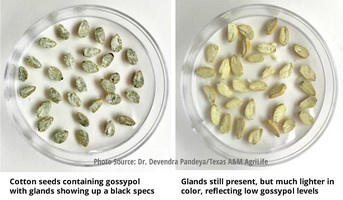
USDA Approves GE Low-Gossypol Cotton
October 24, 2018| |
 The U.S. Department of Agriculture's (USDA) Animal and Plant Health Inspection Service (APHIS) announced the deregulation of genetically engineered cotton with ultra-low levels of gossypol in its seed, which was developed by experts at Texas A&M University.
The U.S. Department of Agriculture's (USDA) Animal and Plant Health Inspection Service (APHIS) announced the deregulation of genetically engineered cotton with ultra-low levels of gossypol in its seed, which was developed by experts at Texas A&M University.
Gossypol is a natural compound present in the pigments of cotton plants which protects them from pests and diseases. Scientists at Texas A&M modified the cotton plant to produce protective levels of gossypol in various plant parts but reduced in the seed. Low gossypol in the seeds is beneficial for agriculture because it reduces the refining cost of cottonseed oil and expands the application of cottonseed in the livestock and aquaculture feed industries.
After considering all the public comments about the draft plant pest risk assessment (PPRA) and draft environmental assessment (EA) of the GE cotton, APHIS conducted a thorough review of the potential environmental impacts in its final EA pursuant to the National Environmental Policy Act, and reached a finding of no significant impact (FONSI).
APHIS concluded in its final PPRA that the GE cotton is unlikely to pose a plant pest risk to agricultural crops or other plants in the US and is deregulating this variety of GE cotton effective on October 17, 2018.
Read the media release from APHIS and Texas A&M AgriLife Today.
| |
Biotech Updates is a weekly newsletter of ISAAA, a not-for-profit organization. It is distributed for free to over 22,000 subscribers worldwide to inform them about the key developments in biosciences, especially in biotechnology. Your support will help us in our mission to feed the world with knowledge. You can help by donating as little as $10.
-
See more articles:
-
News from Around the World
- Ugandan Farmers' Demand for Biotech Intensifies
- Kenyan President Okays Planting of Bt Cotton
- Ethiopian Government Banking on Agri-biotech to Help Steer Economic Development
- Grass Genes for Breeding Better Crops
- Scientists Review Gene Edited Crop Regulation in the US
- USDA Approves GE Low-Gossypol Cotton
- Enzyme Plays Key Role in Plant Response to Cold
- First GM Crop in Indonesia Soon to be Commercialized
- UK Teen Survey Reveals Attitudes Towards Food and Farming
- Hormone Makes Plant Growth Possible in Space
-
Research Highlights
- Sugar Transporter Genes Contribute in Wheat Grain Weight During Drought
-
From the BICs
- PH Experts Provide Training on Eggplant Germplasm Characterization
- PABIC Collaborates with ICCBS and HEC for Science News Writing Course
-
Resources
- Science and She: Dr. Barbara Mugwanya Zawedde
- Updated Pocket Ks on GM Traits
-
Plant
- Cas14: The Newest Addition to the Gene-editing Enzyme Family
- Researchers Present Gene Editing Applications in Horticultural Crops
- CRISPR-Cas9 Used to Retain Function of Mutated Growth Gene in Tomato
-
Read the latest: - Biotech Updates (February 18, 2026)
- Gene Editing Supplement (January 28, 2026)
- Gene Drive Supplement (February 22, 2023)
-
Subscribe to BU: - Share
- Tweet
